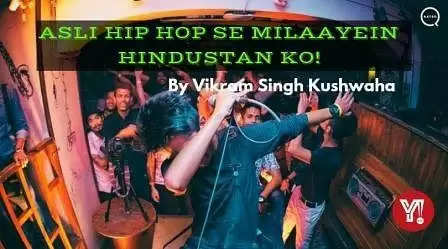ASLI HIP HOP SE MILAAYEIN HINDUSTAN KO!

TNT Y! | By Vikram Singh Kushwaha | Feb 11, 2019
With the release of Zoya Akhtar's Gully Boy right around the corner, the country's imagination has been captured by hip-hop, desi hip-hop to be precise, like never before. Although most of today's 20 somethings grew up listening to Eminem, 2 Pac and 50 Cent, there is a sudden sense of rediscovery about the genre now as if the movie has struck a new chord. It would not be an overstatement to say that Gully Boy is the official coming out party of India's independent hip-hop scene, bringing it out from the shadows of the gully to the opulence of the movie theater in all its Technicolor glory. However, with all the apparent well-intentioned promise and prospects that it brings them, there seems to be an air of skepticism in the Indian hip-hop circles regarding Ranveer Singh's representation of the full picture.
Let us start with Mere Gully Mein, perhaps the most iconic song ever in the history of Indian hip-hop, which catapulted Divine and Naezy to the kind of stardom that is rarely seen in indie music, let alone in indie hip-hop. Released three years ago, Mere Gully Mein was more than a YouTube video gone viral, it represented the culmination of the hopes and dreams of the generations of Indian hip-hop artists who had dedicated their lives to building up the "scene" in the hope that one day their efforts would lead to acknowledgement, maybe not for themselves, but for the movement. When Mere Gully Mein racked up 12 million views on YouTube over three years, that too organically, it was catharsis at last. Here was a song which would provide a foot in the door for the Indian hip-hop artist, the proof that an independent artist with talent could "make it" in the industry and motivation for them to keep persevering. Gully Boy changed all that. In re-enacting the song, almost frame by frame like Gus Van Sant's 1998 remake of Psycho, Gully Boy seems to have ripped out the essence of the original, wrapped it up in Bollywood colored wrapping paper, and presented it to the masses as its gift to the world. Make no mistake, were the movie a biopic based on the life of Divine or Naezy, or if it were starring either of them, or if it was even an accurate representation of the hip-hop movement in India, it would have been completely justified in depicting this milestone as it were because that would have shone the spotlight on those who deserved it. However, in appropriating the song and weaving it in a fictional story,it has unwittingly claimed it as its own in the eyes of the audience, as if with the disclaimer that "Any Resemblance to Actual Persons, Living or Dead, is Purely Coincidental". That Gully Boy's version of Mere Gully Mein has already been viewed more times on YouTube over the last week than the original was in three years speaks volumes.
The problem with Gully Boy, however, goes further than just one song. An underground hip-hop movement has been underway in India since decades now. Without getting into the debate about where exactly it started or who were the original indie hip-hop artists, it is safe to say that more than a few exceptionally talented artists have graced the scene over the years and continue to do so. Machas with Attitude (MWA) from Chennai and Bangalore did it in the 2000s, Khasi Blood from Shillong and MC Cash from Kashmir have received international recognition and coverage while Delhi's Prabh Deep is just starting to make waves in the industry along withSez on the Beat, arguably the country's most sought after producer, who has even composed beats for Chance the Rapper. All of this is conspicuously invisible in Gully Boy. This is not to take away from the creative license of its creators, after all it is still a commercial film and as such has no obligation to portray or not portray any part or facet of reality. The issue here is that Gully Boy inexplicably chooses to showcase some artists over the others with absolute disregard to their proficiency in the trade. A film that was supposed to be a celebration of underground Indian hip-hop, its struggle, its rise and its beauty has, in pacing Bollywood's well-trodden path of empty grandiosity,tragically chosen to pay mere lip service to the very community on which it stands. In doing so Gully Boy has also risked misrepresenting the indie hip-hop circuit to its audience altogether, which could very well skew the fortunes of artists and sub-cultures who have managed to get screen time at the cost of a plethora of others who have worked just as tirelessly to build the scene from ground up.
However, everything said and done, Gully Boy still deserves credit for recognizing the existence of India's hip-hop underbelly, which had flown under the radar for decades, and choosing to wave its banner. The hip-hop community, unconvinced though it might be, is still waiting with cautious optimism for the changes that a Bollywood blockbuster might bring to the country's perspective of its work. After all, a bird in the hand is better than two in the bush, what remains to be seen is whether or not it turns to be the proverbial mockingbird.
For latest happenings in the music scene of Northeast India, follow TNT Y!
You can also send your articles and opinions by mailing them to us at shweta@thenortheasttoday.com and web@thenortheasttoday.com

















